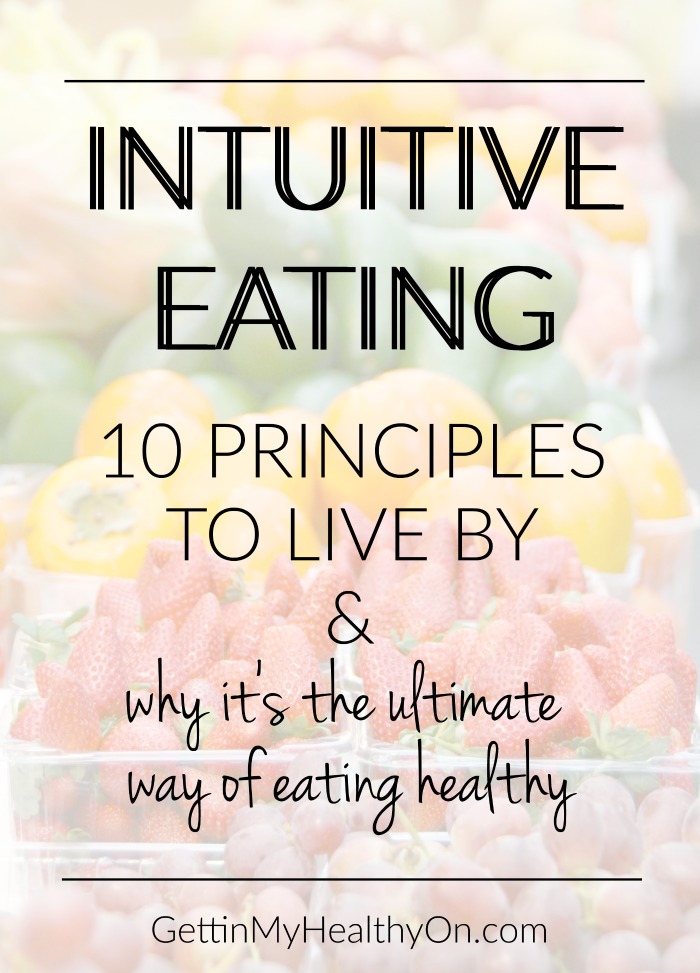Some days my appetite is very low maintenance and easy. Other days it’s completely out of control, and all I can think about is my next snack or meal. Then there’s random times I eat even though I’m not even hungry.
I know I’m not the only one who swears they’re forever hungry. That’s why I wanted to talk about a concept that I feel should be the ULTIMATE goal for establishing a healthy diet: Intuitive Eating.
It’s easy to say “listen to your body” and “only eat when you’re hungry.” But when you’ve been taught rules like eat three balanced meals a day, finish what’s on your plate, and you have to earn your dessert, we tend to obsess over what and how often we eat. Our hunger cues and nutrition needs can become silenced by all of our thoughts of what’s considered right or wrong.
I follow several registered dietitians on Instagram, and in addition to sharing the most gorgeously fresh food, every single one of them emphasizes the same general idea: eat to nourish your body, but don’t restrict yourself from foods if you want them. Every time I read this advice, I find it inspiring. The idea of eating what I want and not seeing foods as “good” or “bad” is pretty liberating. The whole point is to make decisions guided by what our bodies want—to not think so hard about it, but rather, to eat intuitively.
Intuitive eating goes against a lot of what we’ve been trained to think when it comes to food. And yet, at the same time, a lot of it seems like common sense. The whole idea is to reconnect with what our body needs and regain a healthy relationship with food. Intuitive eating isn’t a quick fix or diet program—it’s a way of life. You don’t just…start doing it and suddenly become a master at it. It takes time and practice to make it happen.
10 Principles of Intuitive Eating

The Intuitive Eating website lists 10 principles to help guide you through the process:
1. Reject the diet mentality. Diet fads aren’t designed to offer lasting weight loss results (not to mention they can often backfire due to intense food restriction). Stop believing there’s a secret, perfect diet out there, so you can be free from the false hope.
2. Honor your hunger. Feed your body with nutritious foods and don’t let yourself become ravenous. Being starving destroys your ability to eat in moderation and understand what your body actually needs.
3. Make peace with food. “Give yourself unconditional permission to eat.” When you tell yourself you can’t have a certain food, you feel deprived and can develop uncontrollable cravings that may lead to binge-eating. As soon as food isn’t forbidden, you free yourself from being a prisoner to it.
4. Challenge the food police. Say no to thoughts of food behaviors being good or bad. If you eat a piece of cake, don’t feel guilty or hopeless. Moderation develops as you learn to eat intuitively, but you can’t listen to your body if you’re focusing on what the diet industry has drilled into your mind.
5. Respect your fullness. Pay attention to your body’s cues during mealtime. Be mindful and take a moment mid-meal to ask yourself if your hunger has been satiated yet. If you’re comfortably full, stop eating (even if there’s still food left).
6. Discover the satisfaction factor. In our quest to be skinny and healthy, we forget one of the greatest parts of living: the pleasure of enjoying foods. When you let yourself eat freely, you’ll feel more satisfied and may realize you need less food than you thought to be content and full.
7. Honor your feelings without using food. We go through so many emotions in life, all of which have unique triggers and solutions. From being lonely or sad to feeling nervous or bored, food isn’t the answer—it’s a distraction that, when consumed to numb these feelings, can make you feel worse. Learn how to deal with your feelings in ways that aren’t related to food.
8. Respect your body. There isn’t one cookie cutter diet for everyone. Every body type/shape/size has unique needs, so you can’t expect to obtain your health goals if you mimic what someone else eats. Above all, respect and appreciate your body for what it is and what it can do. Only then can you learn to take care of it properly.
9. Exercise—feel the difference. If a strict exercise program isn’t your thing, get active in another way. Just get moving and pay attention to how your body feels. If you’re only working out to lose weight, for instance, you might lack motivation at times because it can seem like punishment. Focus on how much better you feel after working out/getting active, and you’ll gradually want to do it.
10. Honor your health—gentle nutrition. Your food choices should support your health and be satisfying while making you feel well. You don’t have to eat a flawless diet to be healthy. Not to mention, one snack, meal, or day of eating isn’t going to ruin your efforts and cause you to develop a nutrient deficiency or gain weight. It’s how you eat consistently over time that matters. Focus on progress, not perfection.
Studies have shown that practicing intuitive eating can be more effective for weight loss and do wonders for healing eating disorders. The process simply feels more natural to follow, and it erases our habit of breaking “rules” set by dieting.
I personally think intuitive eating is fascinating. The more I read about it, the more it makes sense. I think the principles that will be the most difficult for me are #3 (make peace with food) and #4 (challenge the food police).
Although I definitely eat a little bit of everything and don’t swear off any specific foods, my subconscious tells me, “Give yourself permission to eat anything…as long as it’s healthy.” I’m very aware when I’m eating a food that has very little nutritious value. I don’t usually experience guilt, since I don’t indulge too often and have decent self-control. But it’s hard to imagine not labeling foods as “good” or “bad.”
I’m planning to actively start incorporating these principles into my life, especially paying attention to the ones that I know I struggle with.
What are your thoughts on intuitive eating?
Are you good at “listening to your body”? Or do you need scheduled mealtimes so you don’t forget to eat?





This is so interesting!!! Thank you for sharing!
My pleasure! It’s a topic I’ve been wanting to introduce for awhile. Writing this made me dig so much deeper into it, and I think it’s so interesting as well. Thanks for reading! 🙂
Never heard of this, but it sounds great! Very healthy outlook 😊👍
Haha indeed! I read about it a few years ago but hadn’t really looked into it until recently.
I can relate to this! I’ve tried dieting before but always fails. Maybe because I torture myself too much. Thanks for sharing this! This is actually my first time hearing about intuitive eating.
So glad this post resonated with you! And ya, dieting has such a way of making people miserable, probably because we try too hard. It’s no way to live!